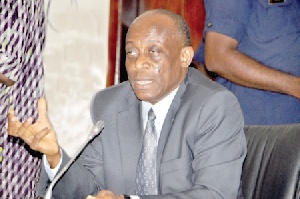The Minister of Finance, Mr. Seth Tekper, has explained that the Public Private Partnership (PPP) initiative is to encourage and promote indigenous private sector participation in the delivery of public infrastructure and services.
He said driving development through PPP initiatives is key to creating employment, developing human capital, promoting local and foreign investment as well as raising the standard of living for the people.
“PPP is a commercial arrangement between a public entity and a private sector party, with clear arrangements on shared objectives for the provision of public infrastructure and services supplied by the public sector,” he said.
The minister said this in an address read for him at the opening of the 3rd Global PPP conference in Takoradi, on the theme ‘Harnessing Local Opportunities, International Expertise and Resources to Accelerate Ghana`s PPP Agenda’.
The three-day conference, jointly organised by C-NERGY Global Holdings -- an investment advisory services firm -- and the Ministry of Finance and Economic Planning, is meant to identify and transform local opportunities into bankable PPP projects so as to promote economic and financial stability in the sub-region.
Also, it is to harness these opportunities and translate them into bankable project utilising and tapping the expertise of professionals across the globe to attract both local and international capital.
According to the minister, government is embarking on an aggressive infrastructure expansion agenda through the PPP.
“Hitherto, government has been depending on its own revenue resources to finance infrastructure projects and services, making it difficult to expand and improve on those facilities” he said.
He said it is estimated that the country will need at least US$1.5billion annually to close the country’s infrastructure gap and bring it to the recommended level for middle income status.
He pointed out that the country has developed a national PPP policy framework that has been piloted with key infrastructural projects; such as the Boankra Inland Port in the Ashanti Region and Eastern Railway Line Project.
He added that projects such as the Takoradi Port and Airport expansion projects, as well as various highway projects which are being delivered through PPP, are seen as models for development globally and government does not intend to re-invent the wheel.
“It is our vision as the Ministry of Finance that the PPP arrangement will continue to offer government an additional tool to finance capital expenditures, grow the economy, increase employment opportunities, extend public services and reduce the burden on public finance,” he said.
Mrs. Magdalene Apenteng, Director of Public Investment at the Ministry of Finance, said the constraint of available resources provides government with the avenue to look for innovate and alternative sources of financing projects.
She said the PPP law is yet to be passed and there are good policies to guard the sector -- India has engaged PPP without laws for well over twenty years.
Deputy Western Regional Minister, Mr. Alfred Ekow Gyan, said government recognises the private sector’s role in national development.
“The private sector has shown significant commitment to support the country’s developmental agenda by contributing money and expertise,” he said.
He noted that the PPP has been responsible for the country’s remarkable and enviable leap into the lower middle income bracket: “We continue to count on the support and expertise of the private sector in leading the country’s development efforts”.
Business News of Saturday, 31 October 2015
Source: B&FT
3rd Global Public Private Partnership confab held in T’di
Entertainment
















